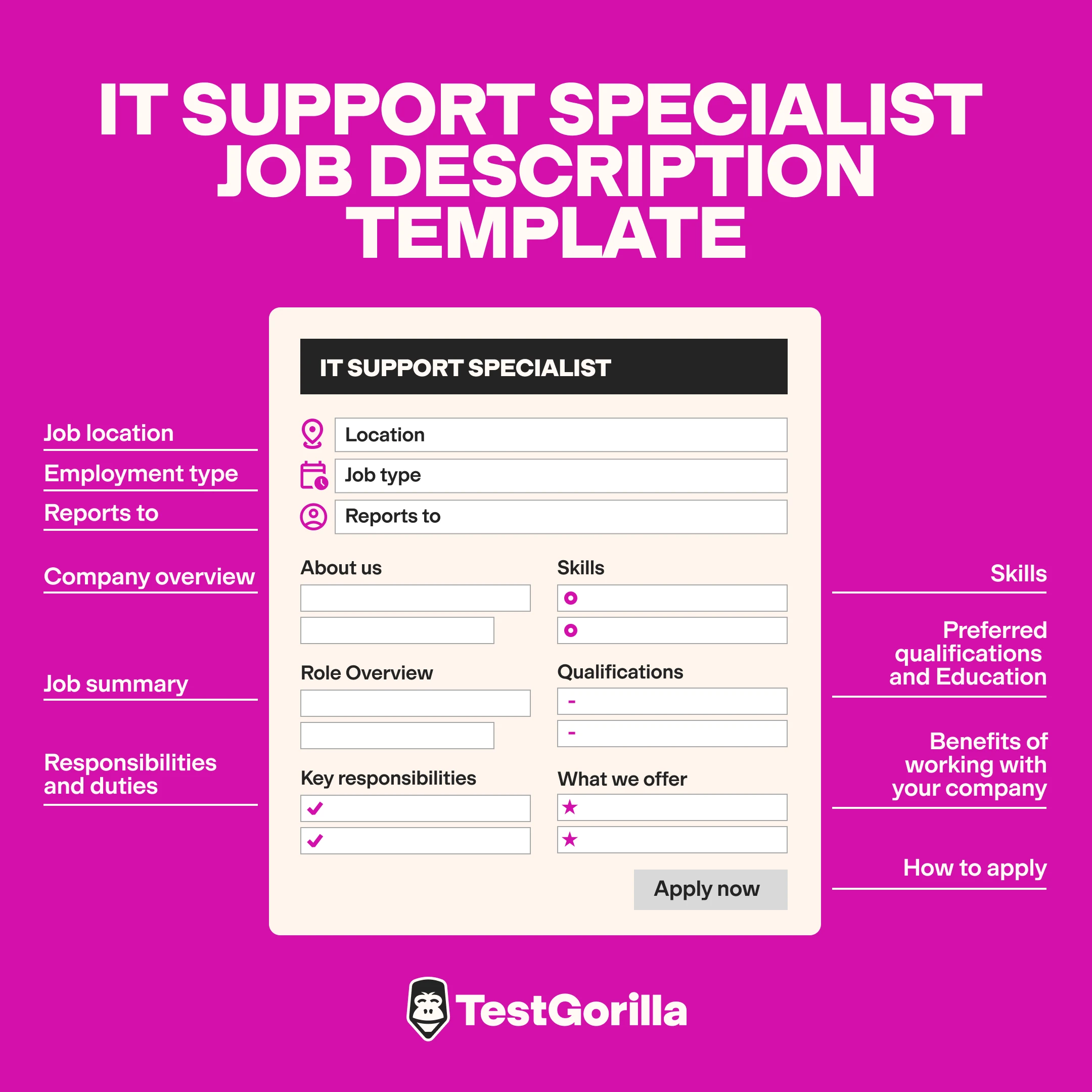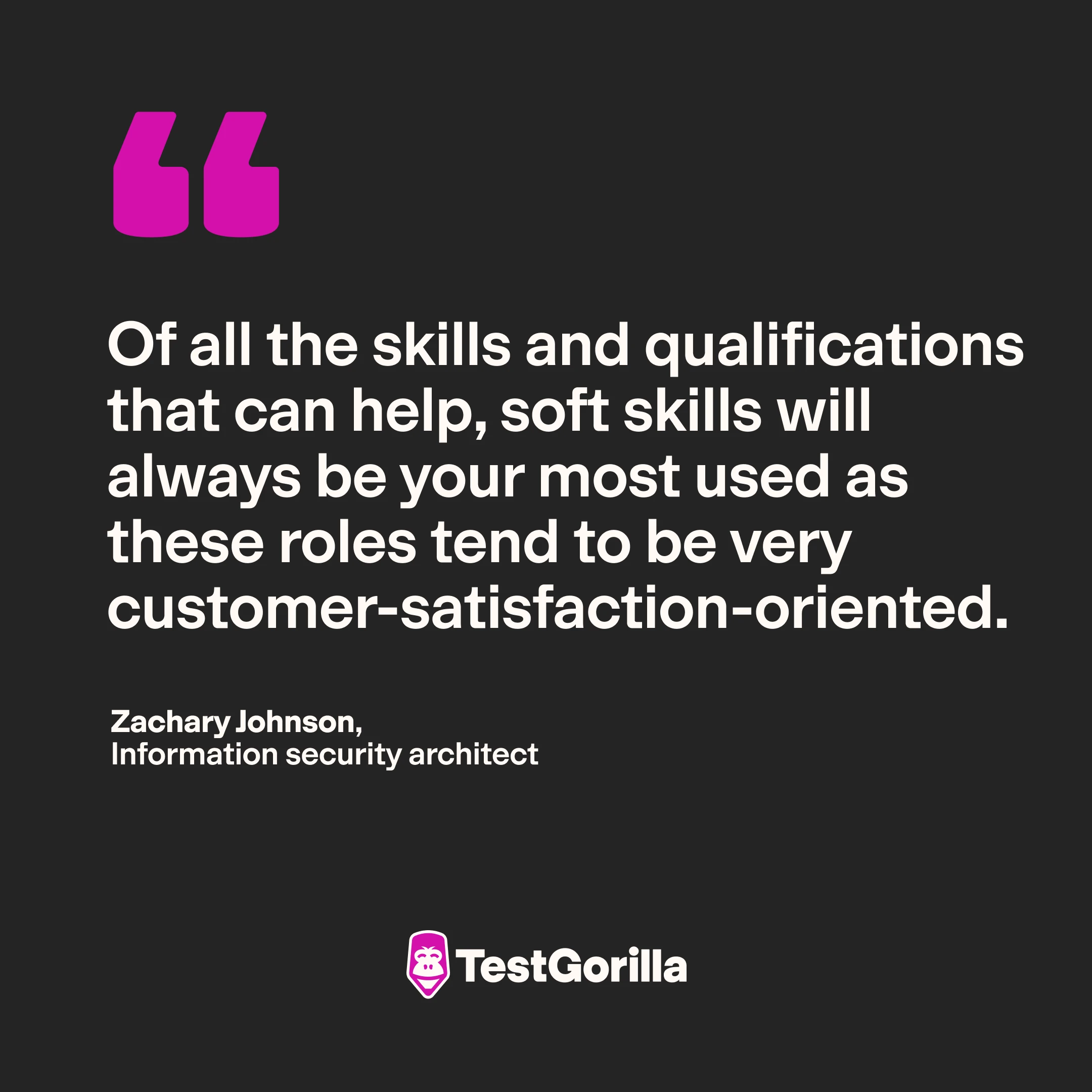IT support specialist job description template: Everything you need to include
An IT support specialist is the go-to for keeping an organization's tech systems in working order. They resolve issues with computers, software, and networks – helping employees or clients along the way.
Writing a job description for this role can be challenging because it covers so much – from fixing tech problems to setting up new systems to assisting users. Another complication? The responsibilities often overlap with other IT roles, making it tricky to capture the full scope without being too vague or overly detailed.
No worries! We’ve put together a template that covers all the key details for IT support specialists. Plus, we walk you through a skills-based hiring approach to help you find the right fit for your team.
Table of contents
IT support specialist job description template
Job Title: IT Support Specialist
Location: [Insert Location]
Reports To: [Insert Line Manager]
Job Type: [Full-time/Part-time/Contract]
About Us
[Your Company Name] is a leading provider of [your services/products/industry sector]. We pride ourselves on delivering outstanding service and support to our [employees/clients] while fostering a collaborative and innovative workplace for our team. At [Your Company Name], we believe in continuous growth, professional development, and providing a great work-life balance for all our employees.
Job Overview
We are looking for an IT Support Specialist who is passionate about technology, eager to solve problems, and dedicated to providing excellent customer service. As part of our IT team, you will be responsible for ensuring our [employees/clients] receive high-quality support for their technical needs. Your role will be crucial in maintaining our company's IT systems, troubleshooting technical issues, and providing timely solutions to ensure seamless operations.
Key Responsibilities
Provide first-line support to users for hardware, software, and network-related issues through various communication channels (phone, email, in-person).
Diagnose, troubleshoot, and resolve technical issues in a timely manner, escalating to higher-level support when necessary.
Install, configure, and maintain hardware, software, and peripheral equipment.
Manage and support user accounts, access permissions, and IT-related documentation.
Perform regular system maintenance, updates, and backups to ensure optimal system performance and security.
Assist in the setup and support of network systems, including routers, switches, and wireless access points.
Monitor and respond to alerts and security incidents, following company protocols to ensure data protection and security compliance.
Collaborate with other IT team members on larger-scale projects and initiatives to improve IT services across the organization.
Document and update technical procedures, user guides, and solutions in the knowledge base.
Provide training and support for users to enhance their understanding of technology and software tools used within the organization.
Skills
Strong troubleshooting and problem-solving skills with a customer-first mindset.
Excellent verbal and written communication skills to convey technical information clearly.
Exceptional customer service skills, with the ability to empathize and effectively communicate solutions to non-technical users, ensuring a supportive and understanding interaction every time.
Proficiency in supporting and configuring Windows, Mac, and/or Linux operating systems.
Familiarity with basic networking concepts (TCP/IP, DNS, DHCP, VPNs).
Understanding of remote support tools and ticketing systems (e.g., Zendesk, ServiceNow, Freshdesk).
Ability to manage multiple tasks and priorities in a fast-paced environment.
Strong attention to detail and ability to work both independently and as part of a team.
A passion for learning and staying updated on emerging technologies and IT best practices.
Preferred Qualifications
Associate or Bachelor’s degree in Information Technology, Computer Science, or a related field preferred.
[X] years of experience in an IT support role or equivalent technical support experience.
Relevant certifications such as CompTIA A+, Network+, Microsoft Certified: Modern Desktop Administrator, or similar are a plus.
Hands-on experience with [mention any specific software, hardware, or systems used by your company, e.g., Microsoft 365, Active Directory, macOS, VMware].
Benefits
Competitive salary and performance-based bonuses.
Comprehensive health, dental, and vision insurance plans.
Paid time off (PTO) and holiday pay.
Professional development opportunities, including training and certifications.
A collaborative and inclusive work environment.
[List any additional benefits your company provides, such as flexible work hours, remote work options, gym memberships, etc.]
Application Instructions
If you’re excited about the opportunity to support our team and help drive our technology forward, we’d love to hear from you! Please submit your [application materials]. Applications should be sent to [email address] or through our career portal [link].
Why this IT support specialist job description template works
This template is designed specifically with IT support specialists in mind, starting with the basics – job title, location, and reporting line – so candidates can quickly see if it’s the right fit.
The About Us section gives a glimpse into the company and its culture, which can help candidates decide if they want to work there. This section spotlights company values that might resonate with tech professionals – like professional growth and work-life balance.
The Job Overview gets right to the point of what IT support specialists care about: solving problems, working with tech, and helping people.
The Key Responsibilities dive into the nuts and bolts of the job, from troubleshooting tech issues to setting up new equipment. These clearly show that this role is hands-on and varied – helping candidates know what to expect.
Next is Skills, which we put before preferred experience because practical abilities – like fixing hardware and handling networks – are must-haves in IT support.
Soft skills are also important. As information security architect Zachary Johnson puts it, “Of all the skills and qualifications that can help, soft skills will always be your most used as these roles tend to be very customer-satisfaction-oriented.”
That’s why we spotlight communication, customer service, and attention to detail. This way, you’ll attract IT support specialists who can keep your operations running without a hitch – whether they’re explaining technical problems in layman’s terms, helping a frustrated employee with a software update, or configuring advanced security settings to protect sensitive data.
The rest of the sections – from Preferred Qualifications to Benefits – give a realistic view of what’s desired (like certifications) and what the company offers in return (like health insurance). This lures in ideal candidates who are satisfied with your offerings.
Notice that we use the word “preferred” to show candidates that it’s not a dealbreaker if they don’t have one or more desired qualifications. This opens the door for people who may not have traditional backgrounds but have the hands-on skills needed to excel in IT support – which is common in IT.
Next steps: Attracting and assessing IT support specialist candidates
Now that you’ve crafted a targeted, skills-based job description for an IT support specialist, where do you post it? You can attract skilled candidates by posting on popular or niche job boards – or take it a step further by reaching out to candidates in IT communities (try subreddits like r/it or r/information technology).
Once candidates come knocking? That’s where TestGorilla shines. Our talent discovery platform helps you identify the perfect fit by assessing various hard and soft skills.
With our library of 400+ science-backed tests, you can objectively measure candidates' technical skills, problem-solving abilities, and customer service expertise.
Our skills assessments let candidates' real abilities shine through, going beyond what resumes can reveal. After all, resumes can be hard to verify and don’t always reflect true capabilities.
With TestGorilla, you can combine up to five different tests to create a custom assessment that fits your hiring needs. Here are some top tests to consider:
Want to go deeper? Add a Culture Add test, or use these IT support interview questions to see how candidates handle real-world tech challenges.
Remember, not every IT support specialist role is the same. You might need someone who excels at resolving complex issues and supporting remote teams, or you might need someone who’s great at managing network security. Explore our full library of tests to find options tailored to your specific needs – from soft skills to software skills tests.
Ready to get started? Schedule a free demo or sign up for a free account with TestGorilla today.
💻 Did you know that if you’re hiring a remote IT support specialist, you can post your job description on our remote jobs board? To apply for your role, candidates simply request to take your assessment. Then, you can see every applicant’s skills right away so you can shortlist the strongest people for your gig.
FAQs
What is a technical support specialist’s salary?
In the US, the median salary for a technical support specialist is about $58,694 a year, while the average sits around $48,667. Pay can vary depending on the state, though. If they're just starting out, they might make around $30,000, but with about 10 years of experience, they could be earning over $78,000 and landing in the top 10% for the field.
Should I require specific certifications for this role?
While certifications like CompTIA A+ or Network+ can be valuable, they shouldn't be mandatory. Focus on practical skills and knowledge, as these often matter more than formal qualifications in IT support.
How do I know if I need a junior or senior IT support specialist?
It depends on your company's needs. If most issues are basic troubleshooting or user support, a junior specialist may suffice. However, if you require someone to handle complex system configurations or network management, you may need a senior-level candidate with more experience.
How can I differentiate the IT support specialist role from other IT positions?
Make sure to clearly outline the day-to-day responsibilities specific to support, such as providing first-line assistance to users, managing help desk tickets, and setting up hardware. Avoid vague duties that could overlap with other roles – like system administrators or network engineers.
Related posts
You've scrolled this far
Why not try TestGorilla for free, and see what happens when you put skills first.
Latest posts
The best insights on HR and recruitment, delivered to your inbox.
Biweekly updates. No spam. Unsubscribe any time.

Skills tests to hire the best
Our screening tests identify the best candidates and make your hiring decisions faster, easier, and bias-free.
Free resources
A step-by-step blueprint that will help you maximize the benefits of skills-based hiring from faster time-to-hire to improved employee retention.
With our onboarding email templates, you'll reduce first-day jitters, boost confidence, and create a seamless experience for your new hires.
This handbook provides actionable insights, use cases, data, and tools to help you implement skills-based hiring for optimal success
A comprehensive guide packed with detailed strategies, timelines, and best practices — to help you build a seamless onboarding plan.
This in-depth guide includes tools, metrics, and a step-by-step plan for tracking and boosting your recruitment ROI.
Get all the essentials of HR in one place! This cheat sheet covers KPIs, roles, talent acquisition, compliance, performance management, and more to boost your HR expertise.
Onboarding employees can be a challenge. This checklist provides detailed best practices broken down by days, weeks, and months after joining.
Track all the critical calculations that contribute to your recruitment process and find out how to optimize them with this cheat sheet.
















